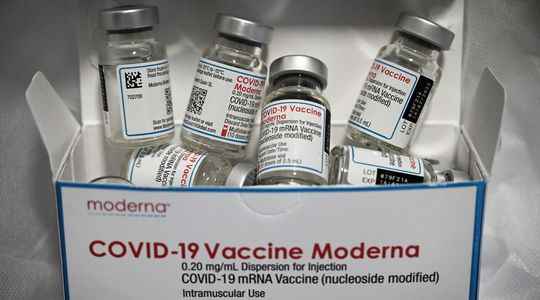Nearly all over the world, the circulation of Covid-19 is declining. Only the Marshall Islands seem to be going against the current: this Monday, August 15, the state of health disaster was triggered after the contamination in one week of more than a tenth of the population of the capital Majuro by the Omicron variant. Another atmosphere in France, where the epidemic continues to fall: 16,347 new cases in 24 hours, Sunday August 14, a drop of 24.1% in seven days.
On the laboratory side, research is continuing to create more effective vaccines against Omicron. Moderna’s next-generation Covid-19 vaccine targeting this variant has been approved by the UK regulator.
- Version of Moderna vaccine targeting Omicron approved in UK
The British drug regulator announced on Monday that it has approved a new generation of Moderna’s Covid-19 vaccine targeting the Omicron variant, a world first according to the laboratory.
This version of the vaccine consists of a so-called “bivalent” booster dose, targeting half the original strain of the virus and half the Omicron variant and “provokes a strong immune response” against both, including against the sub-variants of Omicron BA.4 and BA.5, the MHRA said in a statement.
It “has been approved for booster doses for adults by the MHRA which concluded that it meets the safety, quality and efficacy standards of the British regulator”, added the drug agency. The side effects observed are “typically weak” and similar to those observed for the original serums, it is specified.
- Moderna to open messenger RNA vaccine factory in Australia
The Moderna laboratory announced on Monday the opening of a factory of messenger RNA vaccines in Melbourne, Australia, a first in the southern hemisphere. The project will be based at one of the country’s leading universities, Monash, and will produce 100 million doses of vaccine per year, against Covid-19, influenza and other diseases.
Moderna’s Spikevax against the coronavirus was among the first vaccines to use the new technology called messenger RNA developed during the Covid pandemic. These vaccines, which can be developed quickly, use a molecule to teach the body to identify and fight a pathogen, such as Covid-19, unlike traditional vaccines, which contain a small piece of bacteria or virus. Construction of the Moderna factory is due to begin this year and be completed in 2024.
- The Marshall Islands in turn affected by Covid-19
The Marshall Islands have declared a state of health disaster after the contamination in one week of more than a tenth of the population of the capital Majuro by the variant of Covid-19 Omicron. “We are preparing for the most difficult phase of the epidemic now in Majuro,” Health Minister Jack Niedenthal warned on Monday. After a few local cases were confirmed on August 8, the number of infections soared to 2,800 in a city of 22,500 people.
And the epidemic continues “to gain strength”, warned the Minister of Health, the number of cases having doubled between Saturday and Sunday. “Almost 75% of people tested are positive, which is an incredibly high rate,” he added. Thanks to strict quarantine rules, the Marshall Islands was one of the last countries in the world to be spared from Covid.
- Covid-19 continues to decline in France
According to the latest report from Public health France, 16,347 new cases were recorded in 24 hours, Sunday August 14, a drop of 24.1% in seven days. As of Wednesday August 10, 442 deaths linked to the virus had been recorded over the last seven days (-11.1%).
The current wave of Covid-19 in France, which began in early June, continued in early August the decline that began several weeks ago, in terms of cases and hospitalizations, the public health agency announced on Thursday. As of August 11, the incidence rate (the number of people sick with Covid-19 per 100,000 people) stood at 243.3, showing a decrease of 29.7% in one week.
- China cuts several rates by surprise to revive its economy
The Chinese Central Bank lowered several of its key rates on Monday to support an economy tested by anti-Covid restrictions and a real estate crisis. Several indicators proved disappointing in July, according to official figures published on Monday.
The main indicator of household spending, retail sales increased by 2.7% over one year, against 3.1% in June. Analysts on the contrary anticipated an acceleration (+5%), thanks to a resumption of activity in the country, heavily penalized in the spring by the confinement of Shanghai, the Chinese economic capital, within the framework of the policy ” zero Covid”. For its part, industrial production rose by 3.8% over one year, but this rate is lower than that of June (+3.9%) and analysts’ forecasts (+4.6%). .
